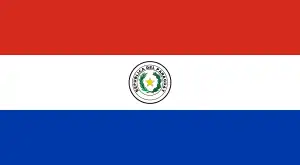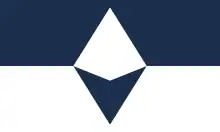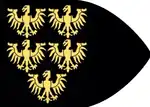Flag information symbols are used by vexillologists to indicate certain characteristics of flags, such as where they are used, who uses them, and what they look like. The symbols were created by vexillologist Whitney Smith and then adopted by the International Federation of Vexillological Associations (FIAV) in the early 1970s.[1] Vexillologist Željko Heimer added the symbols for ![]() normal and
normal and ![]() historical in the early 1990s.[2]
historical in the early 1990s.[2]
Vexillological symbols
Vexillological symbols describe information on a flag's recognition status and design.
| Symbol | Meaning |
|---|---|
| Normal or de jure version of flag, or obverse side | |
| Design was proposed in the past, but never officially adopted | |
| Design is a reconstruction, based on past observation | |
| Reverse side of flag | |
| An acceptable variant of the standard flag | |
| One of several alternative versions a flag that can be displayed | |
| De facto flag, widely accepted and used | |
| Flag has different designs on its obverse side and its reverse side | |
| Obverse side meant to be hoisted with pole to the observer's right | |
| Design officially authorized to represent nation by government of that nation (Not necessary to use when the de jure symbol is used) | |
| Design used in the past, but now abandoned | |
| Reverse side is mirror image of obverse side | |
| Reverse side is congruent to the obverse side | |
| Information on reverse side is not available | |
| Flag can be hung vertically by hoisting on a normal pole, then turning the pole 90° | |
| Flag can be hung vertically by rotating the design first | |
| Vertical hoist method of flag is unknown | |
| Design has no element which can be rotated | |
| Flags can only be hoisted vertically | |
| Flag is not authorized to represent the group or country |


 Flag of Paraguay
Flag of Paraguay
The normal and two-sided symbols indicate this is the obverse side of an authorized flag, and that the reverse side is different..svg.png.webp)


 Flag of Paraguay
Flag of Paraguay
The reverse, official, and two-sided symbols indicate this is the reverse side of an authorized flag, and that the obverse side is different.


 Flag of France
Flag of France
The normal and variant symbols indicate this flag is an acceptable variant of the national flag
 Flag of Antarctica
Flag of Antarctica
The de facto symbol indicates the flag is widely accepted and used, but not codified by law

 Flag of the Margraviate of Austria (976–1136)
Flag of the Margraviate of Austria (976–1136)
The historical and reconstructed symbols indicate the flag is no longer in use, and the design is based on historical records and artifacts
Usage Symbols
The usage symbols are based on a grid of two rows representing use on land and use on water, and three columns representing private use, public use, and military use. Each circle in the grid indicates the flag has one or more of the following six basic usages:
| Private | Public | Military | |
|---|---|---|---|
| Land | Civil flag
Flown by private citizens on land |
State flag
Flown by the government on land |
War flag
Flown by the military on land |
| Water | Civil ensign
Flown by private vessels |
State ensign
Flown by government vessels |
Naval ensign
Flown by military vessels |
A single design may be associated with no usages or multiple usages. Heimer suggested an additional row for air ensigns, but it has not been adopted by FIAV.[2]
| Symbol | Meaning | Symbol | Meaning |
|---|---|---|---|
| Civil flag | National flag | ||
| State flag | National ensign | ||
| War flag | State and war flag, war ensign | ||
| Civil ensign | State flag, civil and war ensign | ||
| State ensign | Civil and state flags and ensigns | ||
| War ensign | State and war flags and ensigns | ||
| Civil and state flag | National flag, civil ensign | ||
| State and war flag | National flag, state ensign | ||
| Civil and state ensign | National flag, civil and state ensign | ||
| State and war ensign | National flag, state and war ensign | ||
| Civil flag and ensign | State and war flag, national ensign | ||
| State flag and ensign | Civil and state flag, national ensign | ||
| War flag and ensign | National flag and ensign | ||
| Civil and war ensign | Civil flag, war ensign | ||
| Civil flag, state ensign | Civil flag, state and war ensign | ||
| Civil flag, civil and war ensign | Civil flag, civil and state ensign | ||
| Civil flag, national ensign | Civil and war flag | ||
| Civil and war flag, war ensign | Civil and war flag, state ensign | ||
| Civil and war flag, state and war ensign | Civil and war flag, civil ensign | ||
| Civil and war flags and ensigns | Civil and war flag, civil and state ensign | ||
| Civil and war flag, national ensign | Civil and state flag, war ensign | ||
| Civil and state flag, state ensign | Civil and state flag, state and war ensign | ||
| Civil and state flag, civil ensign | Civil and state flag, civil and war ensign | ||
| State flag, war ensign | State flag, state and war ensign | ||
| State flag, civil ensign | State flag, state and civil ensign | ||
| State flag, national ensign | State flag and ensign, war flag | ||
| State and war flag, civil ensign | State and war flag, civil and war ensign | ||
| State and war flag, civil and state ensign | War flag, state ensign | ||
| War flag, state and war ensign | War flag, civil ensign | ||
| War flag, civil and war ensign | War flag, civil and state ensign | ||
| War flag, national ensign | National flag, war ensign | ||
| National flag, civil and war ensign | Other |

 The civil flag and ensign of Peru is used by Peruvian citizens on land and sea
The civil flag and ensign of Peru is used by Peruvian citizens on land and sea.svg.png.webp)
 The state flag and ensign is used by the Peruvian government on land and sea
The state flag and ensign is used by the Peruvian government on land and sea.svg.png.webp)
 The war flag is used by the Peruvian Army
The war flag is used by the Peruvian Army
 The naval ensign is used by the Peruvian Navy
The naval ensign is used by the Peruvian Navy
See also
References
- ↑ "FIAV Flag Information Symbols". CRW Flags. Retrieved 2022-10-20.
- 1 2 "The FAME: Symbols and Abbreviations". zeljko-heimer-fame.from.hr. Retrieved 2022-10-21.